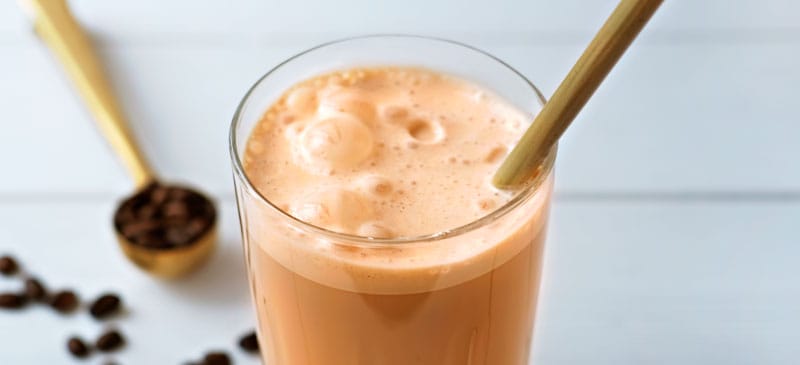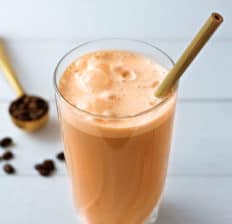What Is Protein Coffee? Benefits & How to Make It

You’ve probably heard that when it comes to managing your appetite and balancing your blood sugar, a high-protein breakfast is the way to go. If you’re like most adults, you also like a cup or two of coffee in the morning to give you a quick boost in energy, and it’d be ideal if you could simply consume protein coffee in the morning.
So this raises the question, “Can I add protein powder to my coffee?”
Yes, you can.
In fact, “protein coffee” is attributed with many of the same health perks as keto coffee (which is typically consumed for its appetite-quelling, fat-burning effects).
Below we’ll look at both the pros and cons of consuming protein in coffee (or coffee-flavored protein powder if you choose to go this route), plus the best way to make protein coffee if you’re interested in adding it to your regular pre-workout or morning routine.
What Is Protein Coffee?
Like the name implies, protein coffee is either protein powder that contains a coffee flavor and caffeine or coffee that you add protein powder to, such as collagen protein, protein from bone broth, plant protein or whey protein.
This protein powder is usually vanilla, chocolate or unflavored.
Although it depends on your preferences, many people consume it as an iced/chilled beverage (like a protein shake) that is made with coffee-flavored protein powder, since most powders usually dissolve well in in cool liquids (but they may become lumpy when added to hot beverages).
Protein is a macronutrient that helps power muscles, supports muscle growth and strength, and assists in exercise recovery. This is exactly why protein powders are popular among athletes and bodybuilders and why they’re also recommended for many active adults who are looking to grow and maintain muscle mass.
Coffee nutrition alone does not provide you with protein (or many calories either). It only has about five calories per cup and almost no fat, protein or carbs.
Many people choose to drink protein coffee before workouts or in the morning to help keep hunger in check. While caffeine may be less beneficial after a workout, protein powder following exercise can help with muscle recovery and support a healthy metabolism.
Others like to sip on caffeinated drinks throughout the day to quench their thirst and appetite, although there are pros and cons to this approach. (For example, it may make you feel jittery and anxious.)
Benefits
Coffee itself, especially high-quality, organic coffee, is linked with some impressive health benefits — such as lowing risk for certain diseases and increasing energy levels, motivation, performance and focus. That’s because coffee contains both caffeine and antioxidants, which studies show together can help promote healthy aging and a high metabolism.
About three to four cups of coffee daily seem to be the sweet spot for providing more benefits than harm, according to one review.
Why add protein powder in coffee? Consuming protein also has many advantages when it comes to physical performance, sustaining high energy levels and achieving body composition improvements.
When you add caffeine to the protein mix, you’ll likely find that you have an easier time building muscle and more power and motivation while working out.
The combination of protein powder and coffee/caffeine together can provide some of the following benefits:
- Support for building muscle mass when combined with strength training, which supports a healthy metabolic rate.
- Help preventing loss of muscle mass/muscle wasting (sarcopenia).
- A boost in exercise performance, including by reducing fatigue and muscle soreness.
- Increased mental focus and help with memory recall and other cognitive functions.
- Reduction in hunger and cravings, which can help with calorie intake and weight loss/weight management, according to many studies.
- Intake of antioxidants that are linked with protection against neurodegenerative conditions like dementia, Alzheimer’s disease and Parkinson’s disease. These include polyphenols and the antioxidants caffeic, chlorogenic, coumaric, ferulic and sinapic acid.
- Increased production of “feel-good hormones” like dopamine and serotonin, which have anti-depressive effects.
- Help with exercise and muscle recovery, due to help from essential amino acids and caffeine’s effects on blood pressure, which help bring more nutrients, fuel and oxygen to muscles.
- Supporting gut integrity and immune function.
- Potentially support for metabolic and heart health by lowering blood pressure, improving circulation, reducing inflammation, normalizing insulin sensitivity and reducing cholesterol.
- Increased intake of vitamins B2, B1 and B3; potassium; and manganese from coffee.
Keep in mind that some people respond to coffee/caffeine badly, so make sure to take it slow when adding more to your routine. Be especially cautious about your caffeine intake if you have a history of anxiety, panic attacks, insomnia, acid reflux, a sensitive stomach or heart disease.
How to Make
To make protein coffee at home, you can either use a coffee-based protein supplement mixed with water or milk, or you can simply add your favorite protein powder to freshly brewed coffee.
Whether you like having protein coffee cold or hot is up to you and may depend on when and where you drink it. The latest protein coffee trend is using cold brew or cold black coffee.
What is the best protein coffee? It all comes down to the quality of the ingredients you use.
For the most benefits, consider using a quality protein powder, such as collagen, hemp or bone broth. Look for one that is made with non-GMO ingredients, no added sugar or fillers, and that’s sourced from humanely raised animals if it’s not a vegan product.
Here are some tips for making protein coffee:
- Most people have the best results when combining protein powder with either cold liquid if you’re willing to blend the two or with piping hot liquid. Hot liquids tend to make the powder become foamy. For the best results, try blending or frothing.
- Some protein powders don’t dissolve well in hot coffee and wind up causing an unpleasant texture. You may have to experiment to figure out which type you like best.
- Avoid adding too much sugar, creamer or milk if weight loss is a goal of yours. Be sure to find a low-sugar protein powder as well.
- Ideally consume coffee with protein about 30 minutes to one hour before a workout or within an hour or so after exercising.
Final Thoughts
- Protein coffee is either protein powder that contains a coffee flavor and caffeine or coffee that you add protein powder to.
- The combination of caffeine and protein (which contains amino acids) can have many positive effects, such as boosting weight loss, reducing hunger, improving focus and stamina during workouts, reducing inflammation, and improving exercise recovery.
- For the best results, drink this combo in the morning to keep your appetite in check or about an hour prior to a workout.
- Choose a protein powder that isn’t made with added sugar, fillers, artificial sweeteners and other additives.

Protein Coffee Recipe
- Total Time: 5 minutes
- Yield: 1 1x
- Diet: Gluten Free
Description
Protein coffee is a very simple concept: It marries the morning iced coffee (often cold brew) with a protein shake. You simply choose the protein shake flavor. It’s a perfect high-protein, low-carb way to start the day.
Ingredients
- 1 cup coffee (such as cold brew)
- 1 cup unsweetened almond milk
- 1 scoop protein powder (collagen protein, bone broth, whey, plant protein, etc.)
- ½ cup ice
Instructions
- Prepare the coffee ahead of time, such as the day before. It needs to be cold.
- Mix the cold coffee with almond milk and protein powder in a blender.
- Pour over the ice in a large glass.
- Prep Time: 5 min
- Category: Beverages
- Method: Blending
- Cuisine: American
Nutrition
- Serving Size: 16 oz.
- Calories: 126
- Sugar: 0.3g
- Sodium: 43mg
- Fat: 3.7g
- Saturated Fat: 0.4g
- Unsaturated Fat: 3.1g
- Trans Fat: 0g
- Carbohydrates: 2.9g
- Fiber: 1.6g
- Protein: 20.6g
- Cholesterol: 4mg




